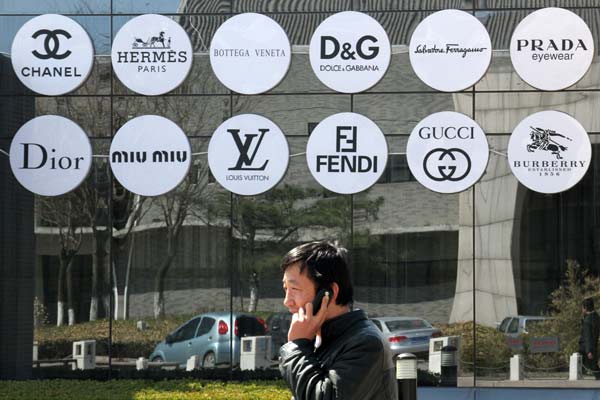Luxury sellers adapt to changing market
Updated: 2013-05-04 01:58
By Meng Jing (China Daily)
|
||||||||
|
 |
|
Luxury brand logos in a shop window in Beijing last month. Wu Changqing / fop China Daily |
High-end demand starts to taper off as authorities target lavish spending
Early last year, eyebrows were raised when 500 grams of high-quality Longjing tea was sold for 180,000 yuan ($29,196) at an auction in China.
The record price for the tea brand made it much more expensive than gold at that time.
However, this spring the situation has changed completely. The price of the same high-quality Longjing has reportedly fallen to around 2,500 to 2,800 yuan for 500 grams, compared with the average price of 3,200 yuan in 2012.
Tea industry experts say that this year's prices are the lowest since 2009.
It is not high-end tea alone that is feeling the pinch.
Expensive luxury watches from Swiss watchmaker Rolex and fancy dinners at top restaurants are all losing sheen as choice gifts among the well heeled.
Frugality has arrived, or rather, been imposed.
High-end demand has tapered off this year due to recent government measures aimed at checking extravagant spending and reining in corruption.
Though it is still early to estimate the actual numbers, some experts maintain that the trend augurs well for the future, as it will lead to a more broad-based and healthy demand.
Others feel that slower high-end product sales will only lead to lower overall consumption.
According to data provided by the National Bureau of Statistics, retail sales in China during the first quarter reached 5.55 trillion yuan, year-on-year growth of 12.4 percent, compared to 14.8 percent for the same period last year.
Though there are indications that demand is likely to fall further, there are also signs that the demand for high-end goods in China is becoming broader and more sophisticated.
Zhao Ping, deputy director of the department of consumer economics at the Chinese Academy of International Trade and Economic Cooperation under the Ministry of Commerce, said that the government crackdown on lavish spending is good for China's consumption market in the long run.
"Less government expenditure on official receptions, vehicle purchases and overseas trips means that more money can be put into the pockets of ordinary people," she said.
Zhao insisted that the curbs on conspicuous consumption are good for sustainable growth as they will cater to a broader spectrum of people.
- Ban on luxury goods
- Our luxuriously departed
- Official sacked for buying luxury car
- Growth in luxury car sales sluggish at start of 2013
- Halt urged to rising luxury goods prices
- Luxury products' consumption declines in China
- No let-up in lure of luxury lines
- The rich seek luxury - away from home
- US stores luxuriate in Chinese cash

 Michelle lays roses at site along Berlin Wall
Michelle lays roses at site along Berlin Wall
 Historic space lecture in Tiangong-1 commences
Historic space lecture in Tiangong-1 commences
 'Sopranos' Star James Gandolfini dead at 51
'Sopranos' Star James Gandolfini dead at 51
 UN: Number of refugees hits 18-year high
UN: Number of refugees hits 18-year high
 Slide: Jet exercises from aircraft carrier
Slide: Jet exercises from aircraft carrier
 Talks establish fishery hotline
Talks establish fishery hotline
 Foreign buyers eye Chinese drones
Foreign buyers eye Chinese drones
 UN chief hails China's peacekeepers
UN chief hails China's peacekeepers
Most Viewed
Editor's Picks

|

|

|

|

|

|
Today's Top News
Shenzhou X astronaut gives lecture today
US told to reassess duties on Chinese paper
Chinese seek greater share of satellite market
Russia rejects Obama's nuke cut proposal
US immigration bill sees Senate breakthrough
Brazilian cities revoke fare hikes
Moody's warns on China's local govt debt
Air quality in major cities drops in May
US Weekly

|

|








